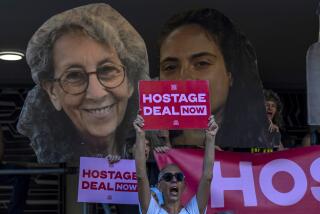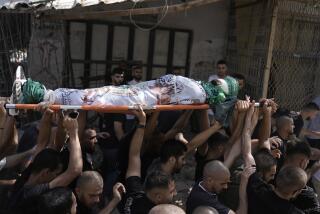Cambodian Peace Talks End in Failure : Dispute Over Khmer Rouge Role Precludes Political Settlement
PARIS â A 19-nation peace conference aimed at averting a widening civil war in Cambodia ended in failure here Wednesday after a month of negotiations did not produce a political settlement between rival forces.
In a short statement issued by the delegates Wednesday evening, the conference reported making some progress but admitted that âit is not yet possible to achieve a comprehensive settlement.â
âWe need time,â said conference co-chairman Roland Dumas, the French foreign minister, in a summary statement, âso that the spirit of reconciliation can overcome the spirit of confrontation.â
Although delegates to the conference, co-sponsored by France and Indonesia, unanimously agreed to seek another meeting next year, the absence of a political agreement between the Vietnam-backed government and the three main resistance parties almost certainly means a round of fighting once Vietnamese forces withdraw from Cambodia in late September.
Sees Move to Battlefield
âMy very sad conclusion,â said Tommy T. B. Koh, Singaporeâs ambassador to the United States and spokesman for the Singapore delegation to the talks, âis that Vietnam and (Cambodian Premier) Hun Sen have decided to take the battle to the battlefield to see how strong the resistance is--at least until the end of the dry season in May.â
âMy own guess is that we will be back here in May, 1990,â he added. âAs in Afghanistan, it is unlikely that either side will prevail. You will find an impasse on the battlefield just as you have at the conference table.â
The main obstacle in the negotiations was the debate over the role of the Khmer Rouge, the Chinese-backed Communist group that terrorized Cambodia from 1975 to early 1979, 3 1/2 years in which more than 1 million civilians were killed or died of hunger and disease.
Resistance leader Prince Norodom Sihanouk insisted that the Khmer Rouge, which has the most effective fighting force, must be included in any political settlement or the pact would be doomed to failure. His position was backed by the United States.
But the government of Hun Sen refused to participate in a regime in which the Khmer Rouge is a member.
âI think Hun Sen was using (Afghanistan leader) Najibullah as an example,â Koh said. âHe figured if Najibullah can survive in Kabul against a much more substantial resistance force (Muslim guerrillas backed by the United States and Pakistan), why couldnât he survive in Phnom Penh?â
In the conferenceâs waning stages, as delegates haggled for seven hours over wording of a one-page final communique, the words of diplomacy turned bellicose.
Sihanouk vowed that his army would defeat the forces of Hun Sen on the battlefield, and Sihanoukâs aides released claims of resistance victories over Vietnamese army forces in recent battles.
âPrepared for the Worstâ
âWe stand ready to assume our national defense,â responded Hun Sen, leader of a little-tested 40,000-strong army and peasant militia. âWe know the Khmer Rouge will attack. We are prepared for the worst.â
Hun Sen estimated rival Khmer Rouge guerrilla forces at 12,000 to 15,000. Western estimates have placed Khmer Rouge forces at 40,000.
Few of the delegates give Hun Senâs forces much chance against the Khmer Rouge. âIf 100,000 Vietnamese troops, considered by some to be one of the finest armies in the world, could not liquidate the Khmer Rouge,â said one delegate, âdo you really think Hun Sen can do it?â
Two other major setbacks at the Paris conference were the inability of delegates to agree on terms of a cease-fire and their failure to create an international mechanism to monitor the Vietnamese troop withdrawal, which begins Sept. 25.
However, in a news conference after the conference, Hun Sen invited journalists and representatives of foreign countries into Cambodia during the withdrawal period. He denied assertions by the resistance that Vietnamese soldiers will simply don Cambodian army uniforms and continue fighting.
In Washington, State Department spokeswoman Margaret Tutwiler blamed Vietnam and Hun Sen for the collapse of the talks. âIt was not possible to achieve a lasting settlement due to the failure of the Vietnamese and the Hun Sen regime to negotiate constructively on key issues,â she said.
However, some delegates contended that Hun Senâs government had been emboldened--and perhaps strengthened--by the monthlong talks. In the early stages, the Cambodian leader, himself a former member of the Khmer Rouge, appeared more willing to negotiate. French officials had said they felt there was at least a 50% chance that the conference would end with a settlement.
But the results of going to the battlefield instead are unlikely to backfire against Hun Sen. If his forces are victorious against the Khmer Rouge, as one delegate said, âthere will be no need for another Paris conference. The other countries of the world will gradually accept Hun Sen as the legitimate leader of Cambodia.â
If he loses, this delegate added, âhe can come back to the negotiating table in the same position as he left it, without compromising anything.â
One of the last delegates to leave the international conference hall was Prince Sihanouk, looking old and frail in the fading light of evening. Avoiding reporters, the former Cambodian monarch was uncharacteristically quiet.
âWe will come back to Paris,â he said. âThis is a very complicated problem. You must be patient.â
More to Read
Sign up for Essential California
The most important California stories and recommendations in your inbox every morning.
You may occasionally receive promotional content from the Los Angeles Times.










